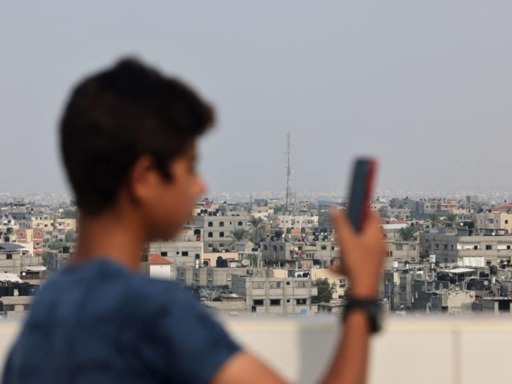At a time when digital infrastructure plays a pivotal role in the global economy, Palestinians in the Gaza Strip find themselves isolated from the world, amid the near-total collapse of communications and internet networks as a result of Israel’s widespread military targeting of digital infrastructure. This collapse is not limited to service disruptions but extends to an emerging economy that was relied upon to mitigate the effects of years of blockade by the Zionist occupation.
Digital paralysis and disconnection from the world
Economic researcher Ahmed Abu Qamar told the Canary that Israel has destroyed about 74% of communication towers and 50% of the public network, turning wires, towers and exchanges into ‘battlefields’ and causing losses estimated at more than $2.6 billion to the Palestinian digital economy.
According to Abu Qamar, the Gaza Strip is experiencing near-total paralysis of telecommunications and internet services, leading to a breakdown in communication between residents and their families, disrupted humanitarian coordination efforts, and preventing direct media coverage in many areas during periods of fighting.
Fifteen cases of complete or partial communication blackouts have been documented since the start of the war, which Abu Qamar described as ‘a strategic blow [by Israel] to the emerging Palestinian economy,’ confirming that thousands of workers in the fields of digital services, remote work, and e-commerce have lost their jobs and sources of income.
Israel’s systematic targeting – and a technological gap
According to the data provided, more than 580 cell towers and fibre optic networks were targeted by Israel, in strikes that affected vital components that were supposed to be a civilian safety net and a conduit for information and emergencies.
Abu Qamar emphasised to the Canary that this targeting ‘cannot be considered collateral damage,’ but rather points to a systematic Zionist policy of digitally isolating the sector and restricting the flow of information.
Despite the world’s reliance on high-speed data transfer and fifth-generation technologies, Gaza continues to operate on second-generation networks only as a result of Israeli restrictions imposed for years on the introduction of modern communications technologies.
Experts believe that this policy deepens the technological divide, hinders investment in technology projects, and limits young people’s ability to integrate into the global economy.
A stalled economy and an uncertain future
Abu Qamar told the Canary that the damage was not only material, but also affected the future of the Palestinian economy, particularly the start-up and technology sector, which was experiencing growth before the war. Thousands of small and medium-sized enterprises that relied on the internet as an alternative economic outlet were also disrupted.
He points out that rebuilding this sector requires major international investment and political will to ensure that civilian infrastructure is not targeted again, as this is a prerequisite for any future economic recovery.
Featured image via the Canary
By Alaa Shamali
From Canary via this RSS feed


